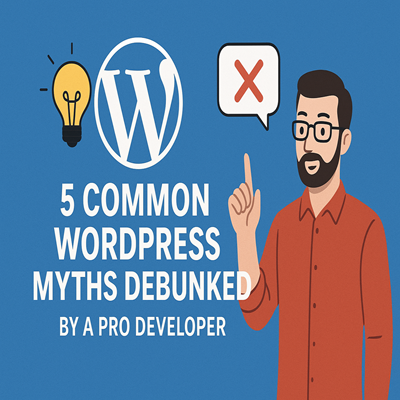
WordPress powers over 40% of websites on the internet, yet it’s surrounded by several myths that can mislead beginners and even experienced business owners. As a professional developer, I’ve seen many misconceptions discourage people from choosing WordPress or using it to its full potential. In this blog, I’ll debunk the five most common myths about WordPress.
Myth 1: WordPress Is Just for Blogging
Many people still believe WordPress is only for creating blogs. While it started as a blogging platform, it has evolved into a full-fledged content management system (CMS). Today, WordPress powers eCommerce stores, corporate websites, portfolios, membership sites, learning platforms, and much more. Plugins like WooCommerce and LMS tools make it incredibly versatile.
Truth: WordPress is powerful enough to build any kind of website, from small personal blogs to enterprise-level solutions.
Myth 2: WordPress Websites Aren’t Secure
A common myth is that WordPress websites are easy targets for hackers. In reality, WordPress is as secure as any other platform if managed properly. The real problem comes from outdated themes, plugins, or poor hosting services.
Truth: With regular updates, strong security plugins (like Wordfence), and a reliable hosting provider, a WordPress site can be extremely secure.
Myth 3: WordPress Can’t Handle Large Websites
Some assume that WordPress is only good for small websites and will crash under heavy traffic. This couldn’t be further from the truth. High-profile brands like TechCrunch, BBC America, and The Walt Disney Company run their sites on WordPress.
Truth: With optimized hosting, caching, and proper configuration, WordPress can handle millions of monthly visitors.
Myth 4: WordPress Is Bad for SEO
Another myth is that WordPress doesn’t perform well in search engine optimization (SEO). In fact, WordPress is considered one of the most SEO-friendly platforms. Plugins like Yoast SEO and Rank Math help optimize content, meta tags, sitemaps, and more.
Truth: WordPress offers built-in SEO-friendly structures and can rank just as well—if not better—than other platforms when optimized properly.
Myth 5: WordPress Is Free, So It Must Be Low Quality
The fact that WordPress is open-source and free often makes people think it’s “cheap” or not professional enough. The truth is, WordPress is maintained by a massive global community of developers who contribute to its growth and improvement.
Truth: WordPress is trusted by major companies worldwide, and its open-source nature makes it flexible, reliable, and scalable.
Conclusion
WordPress is a robust, flexible, and professional-grade CMS that continues to dominate the web for good reason. Don’t let these myths hold you back from harnessing its full potential. With the right setup, security measures, and optimization, WordPress can support any project you have in mind.
